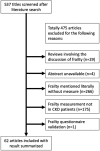Contributors, risk associates, and complications of frailty in patients with chronic kidney disease: a scoping review
- PMID: 31632625
- PMCID: PMC6778996
- DOI: 10.1177/2040622319880382
Contributors, risk associates, and complications of frailty in patients with chronic kidney disease: a scoping review
Abstract
Frailty exhibits diverse influences on health-related outcomes and represents a surrogate of increased susceptibility to harmful injuries. Patients with chronic kidney disease (CKD) are at a higher risk of accelerated biologic aging, and, in this population, the concept of frailty emerges as an instrumental measurement of physiologic reserves. However, a comprehensive description of known independent contributors to, and risk associates of, frailty in these patients remain unavailable. In the present review, original studies up to 28 February 2019 that assessed frailty in patients with all stages of CKD were retrieved and reviewed, with results extracted and summarized. By pooling 62 original investigations, 58.1% and 49.1% used cohort and cross-sectional designs, respectively. Dialysis-dependent end-stage renal disease patients (n = 39; 62.9%) were the most commonly examined population, followed by those with nondialysis CKD (n = 12; 19.4%) and those receiving renal transplantation (n = 11; 17.7%). Contributors to frailty in CKD patients included sociodemographic factors, smoking, CKD severity, organ-specific comorbidities, depression, hypoalbuminemia, and low testosterone levels. Conversely, the development of frailty was potentially associated with the emergence of cardiometabolic, musculoskeletal, and cerebral complications; mental distress; and a higher risk of subsequent functional and quality-of-life impairment. Moreover, frailty in CKD patients increased healthcare utilization and consistently elevated mortality among affected ones. Based on the multitude of contributors to frailty and its diverse health influences, a multifaceted approach to manage CKD patients with frailty is needed, and its potential influences on outcomes besides mortality need to be considered.
Keywords: chronic kidney disease; dialysis; end-stage renal disease; frailty; kidney transplantation; outcome; risk factors.
© The Author(s), 2019.
Conflict of interest statement
Conflict of interest statement: The author(s) declared no potential conflicts of interest with respect to the research, authorship, and/or publication of this article.
Figures



References
-
- Cesari M, Calvani R, Marzetti E. Frailty in older persons. Clin Geriatr Med 2017; 33: 293–303. - PubMed
-
- Fried LP, Tangen CM, Walston J, et al. Frailty in older adults: evidence for a phenotype. J Gerontol A Biol Sci Med Sci 2001; 56: M146–M57. - PubMed
-
- Cesari M. Role of gait speed in the assessment of older patients. JAMA 2011; 305: 93–94. - PubMed
-
- Vermeiren S, Vella-Azzopardi R, Beckwée D, et al. Frailty and the prediction of negative health outcomes: a meta-analysis. J Am Med Dir Assoc 2016; 17: 1163.e1–e17. - PubMed
Publication types
LinkOut - more resources
Full Text Sources

